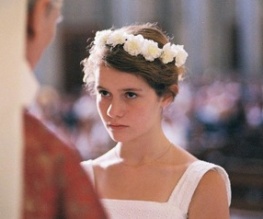Love Like Poison

At first glance, Un Poison Violent (the title, which is hyper-loosely translated to ‘Love Like Poison’, comes from a Serge Gainsbourg song), looks like a caricature of a French art-house film. Conflicts between rigid Catholicism and rebellious passion? Check. Moody shots of people looking out of windows, wondering when things got so complicated? Check. The sexual awakening of an improbably busty fourteen-year-old whose nubile charms just serve to remind her mother of how the implacable march of time has stripped her of all allure and left her a dried-out husk whose husband has made a mockery of the vows they shared by clearing off with some dolly-bird? Well, perhaps that one is a bit more specific.
When Anna (Augarde) left for boarding school, she was waved off by two happy parents and her doting grandfather. She returns home to a broken home; her deeply Catholic mother, Jeanne (Lio) is dreading the prospect of a divorce following her husband’s abrupt departure from the family home, and his father (Galabru) is slowly dying in a darkened sick room. That’d be enough to shake anyone’s faith, even without the addition of a precocious choirboy who’s substantially more interested in the pleasures of the flesh than the virtues of the spirit – and unfortunately for Anna’s mother (but much to Anna’s delight), he’s the next person to enter the story. Pierre (the spectacularly-named Youen Leboulanger-Gourvil) is a free spirit who thinks he might be an atheist, and his carefree influence conspires with the drama surrounding Anna to test her nascent faith to its limits.

The above still says a lot about Love Like Poison – it’s a shy, retiring feature which nevertheless knows which of its assets are most likely to shock and isn’t afraid to use them to best effect. Writer-director Katell Quillévéré builds the tension surrounding the two female leads with consummate ease, juxtaposing Anna’s uncomplicated ‘strolls’ in the woods with Pierre and the storm of frustration and ill-feeling which Jeanne’s Catholicism is bringing to the family. Belgian chanteuse Lio is believably hurt and confused by both the chaos in her life and her burgeoning attracting to the charismatic local priest (Stefano Cassetti), and Michel Galabru’s bawdy grandfather will speak to anyone who has struggled against the enforced virtue of strict religious faith.
One actress, however, stands head and shoulders above the rest of the cast. Clara Augarde’s turn as the fast-maturing and increasingly sexually aware Anna is one which will stand her in good stead for years to come – by turns tender and passionate, her performance is made all the more impressive by the difficult parallels which must necessarily exist between the character and the actress herself. Anna’s actions on-screen are frequently controversial and highly intimate, and it is to Augarde’s immense credit that she was so evidently unfazed by the physical and emotional exigencies of her role.

No emerging director could be expected to avoid every potential pitfall over the course of their first feature, and there are certainly elements of the film which feel awkward – most notably the inclusion of English folk music throughout, which is unnecessary and distracting. However, this is a very minor complaint, and on the whole Katell Quillévéré can barely be faulted – Love Like Poison would be a fine achievement for any director, let alone someone so new to full-length film making. The film itself is awaiting a UK distribution deal, but if it makes it to cinemas you simply must go. You must.





Recent Comments